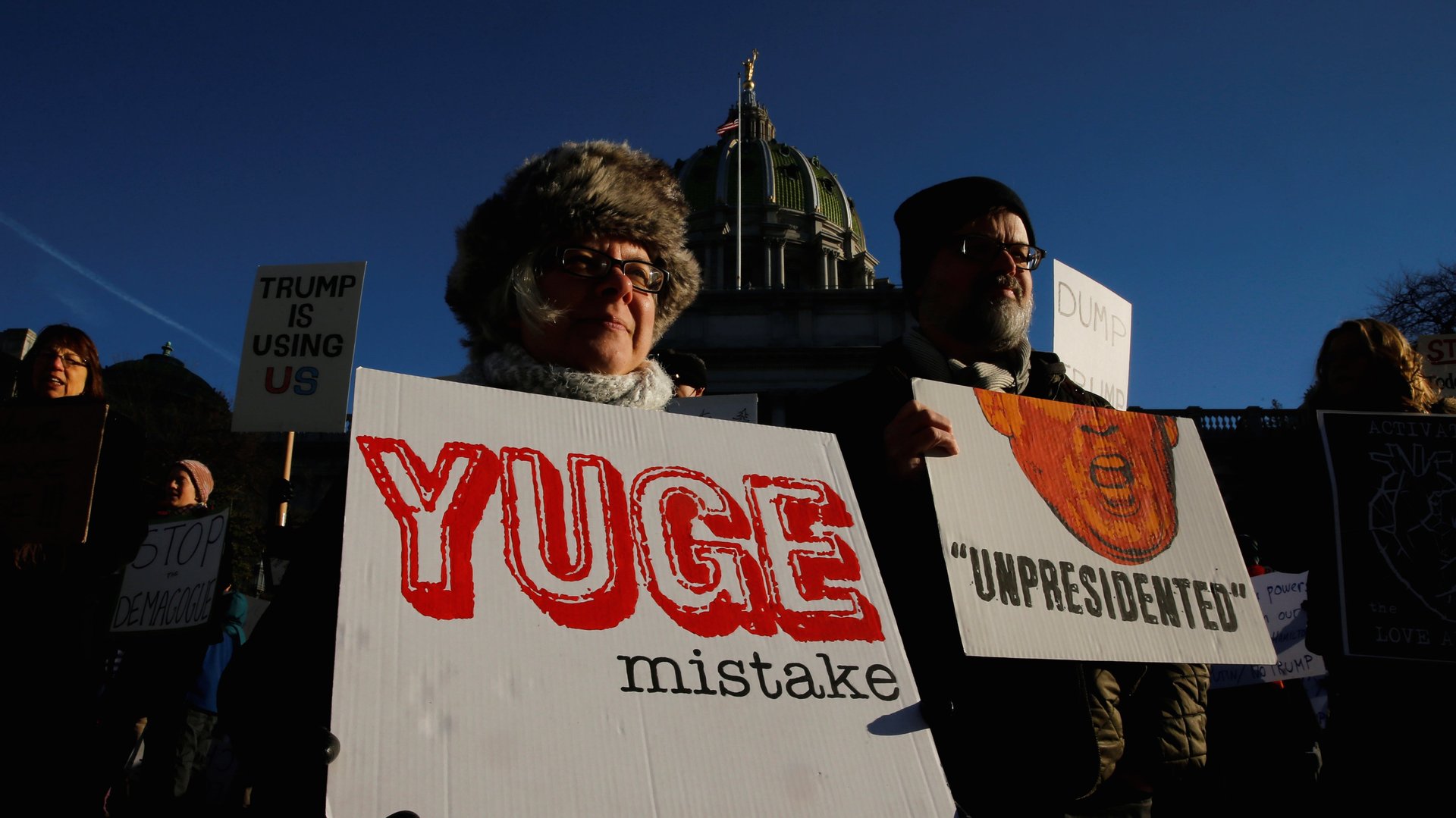Dictionaries’ 2016 words of the year show how anxious we’ve all become
Every year is turbulent and inherently full of events—births, deaths, war, terror. The rise and fall of leaders. The beginning and end of trends. But 2016 felt particularly disconcerting, and feelings are playing an increasingly important role in shaping reality.


Every year is turbulent and inherently full of events—births, deaths, war, terror. The rise and fall of leaders. The beginning and end of trends. But 2016 felt particularly disconcerting, and feelings are playing an increasingly important role in shaping reality.
In a tradition that dates back at least a decade, dictionary-makers have chosen one word each year that reflects a shift in cultural discourse. Last year Oxford chose 😂, the tears-of-joy emoji, signaling that the pictographic language had gained the legitimacy of old-timey words (this made some people very 😠). This year, four major English-language dictionaries chose very different words, but all of them reflect a similar theme about the current reality—uncertainty. People are on edge—see: the Syrian civil war, international terrorism, the Brexit vote, and the election of Donald Trump—and it shows in our vocabulary:
Cambridge Dictionary researchers examined data from hundreds of millions of online searches to see which words sparked the most interest in 2016, finding that “‘paranoid‘ stood out as the clear frontrunner.” The data showed a fourfold increase in searches for the word “paranoid” from all over the world, suggesting that people everywhere are feeling warier than ever before. Wendalyn Nichols, publishing manager for dictionaries at Cambridge University Press, said in a statement that “the world as a whole feels a lot more uncertain than it did compared with even a year ago.” He noted that there were also large increases in searches for words along a similar theme: “anxiety” and “chaos.”
Post-truth: Relating to or denoting circumstances in which objective facts are less influential in shaping public opinion than appeals to emotion and personal belief.
Oxford Dictionaries chose “post-truth,” introduced in 1992, as its international word of the year, noting a 2,000% increase in the term’s use over 2015. Citing the Brexit vote and Trump’s election, Oxford’s editors determined that “post-truth” best “captured the ethos, mood, or preoccupations” of 2016. “It’s not surprising that our choice reflects a year dominated by highly-charged political and social discourse,”Oxford Dictionaries president Casper Grathwohl said in a statement. The need for a term to describe the uncertainty of these times was “fueled by the rise of social media as a news source and a growing distrust of facts offered up by the establishment,” he added.
Surreal: Marked by the intense irrational reality of a dream.
In an uncertain world, the unbelievable becomes routine, and strange is the new normal. According to Merriam Webster Dictionary, “surreal” was the word of the year; searches for the word rose dramatically after multiple terrorist attacks, and especially after the US elections in November. In a statement, the editors noted that the term is “often looked up spontaneously in moments of both tragedy and surprise, whether or not it is used in speech or writing. This is not surprising: We often search for just the right word to help us bring order to abstract thoughts, emotions, or reactions. ‘Surreal‘ seems to be, for 2016, such a word.”
Xenophobia: Fear of the foreign or other.
Dictionary.com’s choice for word of the year “embodies a major theme resonating deeply in the cultural consciousness over the prior 12 months.” The editors explained that, based on terms of interest to users, 2016 was unusually fearful. Lookups for “xenophobia” rose most after Brexit and then again after the US election. ”This year, some of the most prominent news stories have centered around fear of the other…this particular year saw fear rise to the surface of cultural discourse,” Dictionary.com said in a statement. “Because our users’ interest in this overarching theme emerges so starkly for one specific word in our trending lookup data, “xenophobia“ is Dictionary.com’s 2016 Word of the Year.”
🕊 🌍 ☮ ✌️
If the notion of a paranoid, surreal and xenophobic post-truth world is bringing you down, worry not. The new year is almost here, and hope springs eternal. Start resolving now to make “peace” the defining word of 2017.